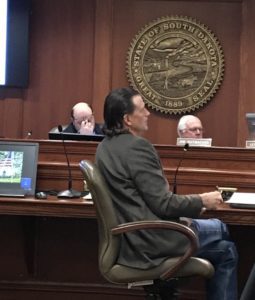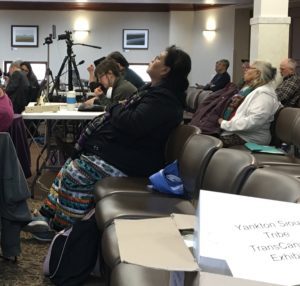
On October 29th-31st, Dakota Rural Action and other contesting parties returned to Pierre for a second round of hearings in front of the DENR Water Management Board (WMB) in regard to permits for TransCanada’s Keystone XL pipeline. Three permits are for the taking of public water from rivers (the Cheyenne, Bad, and White), and two permits are for use of previously-appropriated water permitted for livestock watering that would serve as back-up supply for TransCanada’s construction worker man camps.
These hearings are a continuation of the process that began about a year ago–although TransCanada started planning the KXL in the previous decade, applications for water use related to construction, by contrast, were made relatively recently. The WMB hearings of late October were a “second round” to follow up on two days of hearings that took place earlier in the month. A third round of dates–December 17-19 and potentially the 20th–is now scheduled, although it is possible that in order to hear from all witnesses of all parties, proceedings will continue on into the new year.
Parties to the proceedings (not all parties are contesting all permits) include Dakota Rural Action, Rosebud Sioux Tribe, Yankton Sioux Tribe, Cheyenne River Sioux Tribe, Great Plains Tribal Water Alliance, and several individual citizen intervenors from both South Dakota and Nebraska.
While the two days of hearings in early October only allowed for one witness (DENR Surface Water Engineer Mark Rath) to give testimony and be cross-examined, the late October dates provided much more variety of witnesses, including two of TransCanada’s witnesses (both of which will return for further testimony in later hearings), an expert on oil spills presented by the Yankton Sioux Tribe, and witnesses presented by individual intervenor Elizabeth Lone Eagle on cultural, spiritual and subsistence uses of the water by tribal citizens, as well as attempts to remedy serious holes in state law regarding protection of people, water, and land from pipelines and oil & gas development.
During the course of the proceedings, and as previous spills and leaks by TransCanada and other pipeline operators were being discussed, news reports began to trickle in about a new spill in North Dakota on TransCanada’s Keystone 1 line. Initial company estimates (which are almost invariably low-balled) put the magnitude of the spill at 383,000 gallons, or over nine thousand barrels, with some of the tar sands oil flowing into a wetland.
This most recent spill brings stark clarity to the fact that, despite lack of consideration by DENR staff in their recommended approval of these permits, the quantity of water available to downstream users is highly dependent on the quality of that water. Abundant water (which is not by any means guaranteed–especially West River) that is contaminated by an oil leak or spill is damaging at best–and deadly at worst–to the health of people, livestock, wildlife, and fisheries.
Dakota Rural Action and other contesting parties have been accused of using these water permit hearings as a “delay tactic,” as though the outcome is inevitable. Certainly that false narrative works to the company’s advantage. TransCanada seems to believe they have an inherent right to take what belongs to

the people of South Dakota–their land through the process of eminent domain, and their water through this DENR permitting process–and TransCanada wants the Water Management Board and the people of South Dakota to believe that false narrative, too.
Dakota Rural Action and other contesting parties recognize that this water belongs to the people of South Dakota, and that the Water Management Board, as trustee of our water, has the authority to say no. And, through the course of these hearings, we are building a powerful case that the Board has the responsibility to say no to a foreign corporation with a devastating history of spills and leaks that have damaged land and water in this state and others in which they operate.
Please plan to attend the next scheduled hearing dates (December 17-19) to provide your input and support to those protecting the water for current and future generations. Typically, the public comment period has been scheduled for 8:30am CT on the first day of each round of hearings. If you’d like assistance preparing your comments, please contact DRA Senior Organizer Rebecca Terk at rebeccat@dakotarural.org or call (605) 697-5204 x 260.
Additionally, whether or not you can attend, SIGN ON to our letter to the Water Management Board asking them to deny any permits for the grating of public water to a foreign corporation with a history of abuse to water, land, and people.
